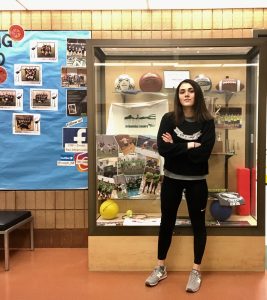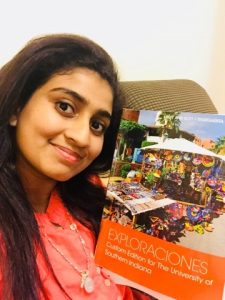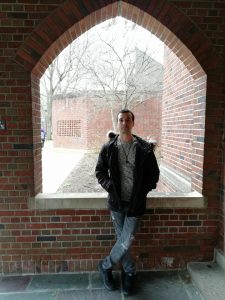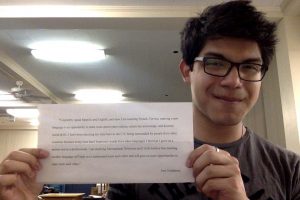For the Love of Language
This month’s Global Gazette shines a light on Global UGRAD students who have embarked on learning multiple languages. Far from being content with mono-, bi- or even trilingualism, here are a few examples of Global UGRAD students who push themselves towards learning new languages.
Leila Pyreva, Russia, University of Wisconsin Green Bay

I have never thought about learning languages as my main goal in life. I treat it more like essential tools for expanding my future career. It has never been hard for me; as long as I’m doing it, I sincerely enjoy it. I did it well in school years, that time I studied French and Latin. Then entering university I concentrated on English and German, which are still my major languages.
In the U.S. I enrolled in Spanish class as well, so now it has been three months as I learn it and, what’s incredible, I am already able to speak and comprehend the language. However, I have to admit that studying three languages at the same time is challenging, and sometimes my mind is overloaded and gives ridiculous jokes – speaking Spanish adding German articles to the words.
There’s no sense to emphasize once again how necessary it is to learn languages in the 21st century. We travel more than people ever could. We trade the same goods. We surf the same Internet. We watch the same YouTube videos. So honestly, this is more a necessity if you want to be successful nowadays – speak at least two languages. But what’s intimate for me in learning languages – I am looking for sounds, or how my speech could sound when I speak different languages. Phonetics of one particular language, its tone and melody are so unique. And I cannot get rid of jealousy if I hear one beautiful language and am unable to speak it just like this. Certainly, I do not have passion for every sound I hear – it would drive me crazy. Now my passions are German and Spanish. This year my playlist has changed from Russian and English songs to only Spanish and German music. I know how controversial it might seem, but this is my way of worship for languages.
Utthara Wanigasekara, Sri Lanka, University of Southern Indiana

First I have to tell you I never had a Spanish-speaking environment or any other related culture in my country. So I thought to challenge myself to learn this language, because what I noticed in the U.S. was that the majority of people can speak Spanish.
I am studying International Relations, and according to my knowledge, most of the countries in the world have a Spanish influence. I thought it will be a great advantage for my future career and also to develop cross-cultural understanding by learning Spanish. It is a super hard subject for me – yet, the courage and the interest for the subject help to create self confidence to improve the language. I have a lot of friends who speak Spanish and they really help in studying.
Kelvin Getuno, Kenya, Northern Michigan University

Bonjour, à toute la classe? the sweet but strong, loud voice said from the back of the class. Everyone turned in time to see the professor walk into class pulling behind her a tiny suitcase, which I assumed had books for our French class – I was wrong. A few of us muttered a weak bonjour back but most of the class just stared blankly at her as she made her way to the front of the room. She proceeded with more niceties in French, to which most of us just gave her that look of “is this how you want our first class to end?” Suddenly she said, “Répétez après moi!” and went ahead to say phrases which we repeated as greetings. Ca va, enchanté and à plus tard were learnt that day and so were comment appelles-tu?, comment vous appelez-vous?, and je m’appelle; this marked the start of a three and a half month journey of elementary French.
Over the next several weeks, I was quickly introduced to an assortment of definite and indefinite articles, verbs, adjectives, and pronouns (among other parts of speech) that make up the beautiful French language.
I currently speak five languages frequently: Luo, Kikuyu, Kisii, Swahili and English. All are spoken in Kenya, Swahili and English both being national and official languages respectively, and French which I’m not as fluent in yet. I can hear a bit of Luhya and Kamba, which are local subtribes here. I want to learn all the five United Nation’s languages in the next 10 years.
I’m inspired to learn new languages because as a teacher, I don’t intend to just teach in Kenyan colleges, I’d love to teach all over the world. Knowing the local languages from those areas would give me an edge as I would easily communicate with students whose mother tongue could be the only language they know. It’ll also give me wider career options. I also want to retire in politics, so it’ll help me with diplomacy in future.
Kumhyang Kim, South Korea, East Tennessee State University

Last semester, I met some Japanese classmates in the ELS (English Language Service) center. Even though I live very close to Japan, I didn’t know much about Japanese people. During that period, I found that Japanese students are very sincere and respectful to the others. Hardly ever did I see them wasting food when we were eating together. They said that someone grew the plants and the crops, and someone prepared the food for others, so we have to respect all their work. I was so impressed by their mindset and wanted know more about Japan and Japanese culture. That’s why I am taking Japanese class this semester.
Sometimes language becomes a cultural boundary because every language has its own unique system. Learning a new language is not just about the language, it’s related to the history, culture and people, etc. Japan and South Korea are part of the “Chinese character cultural sphere”. Both countries are still using Chinese characters, but they also created their own unique language system. I believe that learning Japanese can help me have one more cultural aspect and better understand South Korea and Japanese relations.
Itmareli Rodriguez, Panama, Emporia State University
My name is Itmareli Rodriguez, and I’m from Panama. I speak Spanish as my native language but I also speak two other languages: English and Korean. My willingness to learn hasn’t finished, so after my amazing experience as an exchange student in Emporia, Kansas, I have decided to learn Russian. I met friends from Ukraine, Turkmenistan and Azerbaijan – all of whom speak Russian in addition to their native language – and I wanted to be able to speak to them in a language that they were more related with than English. I also have planned to study French, Chinese, and Portuguese. Because I studied Korean before to go to the U.S., I had a fantastic experience sharing with Koreans, which impacted my desire to learn more; even though my knowledge of the language was basic, I was able to share thoughts and culture using the same language, which made them really comfortable and made me proud of what I could do. That’s actually what inspires me to learn even more languages: the ability to communicate with other people in their own language and be able to feel empathy with the other person when they can communicate without having to think too much what they want to say. Finally, some people have asked me, “why did you learn Korean?” My answer is simple: I want to study my Master´s degree in International Relations in South Korea, and also I love South Korea! You may find yourself asking “why learn so many other languages?” My answer is: why not?
Wael Seh, Israel, Nazareth College

I have had the opportunity to learn Arabic, Hebrew and English. I’ve been studying these languages since I was in elementary school. My home university does not offer Spanish courses, but now I’ve already started studying Spanish in the U.S. Even though I am learning only just Spanish, I have met people who study different languages like French, German and Italian. They are wonderful people who like to know everything about culture, not just language. I was inspired to expand my knowledge in languages when I started studying translation. Through my coursework, I understood that I need a deeper understanding of culture in order to fully understand a language. Language learning directed my focus toward cultural appreciation in an unusual way, allowing me to appreciate greater nuances about people through their relationship with words, landscapes, and social traditions linked to history. In terms of the impact that language learning will have on my future, I view it as a window into greater cultural understanding that will be edifying to me in several ways. In practical terms, it will be a great instrument for me as a translator. But at a personal level, it will make me a more well-rounded individual with a broader perspective on life, drawing from the different cultural perspectives that I will be able to soak in through language and the literature tied to it.
Jose Galdamez, Guatemala, Juniata College

I currently speak Spanish and English, and now I am learning French. For me, learning a new language is an opportunity to learn more about other cultures, enrich my knowledge, and develop social skills. I have been enjoying my time here in the U.S. being surrounded by people from other countries because every time that I learn new words from other languages, I feel that I grow as a person and as a professional. I am studying International Relations and I truly believe that learning another language will help us to understand each other more and will give us more opportunities to learn from each other.